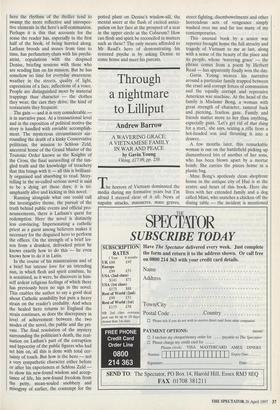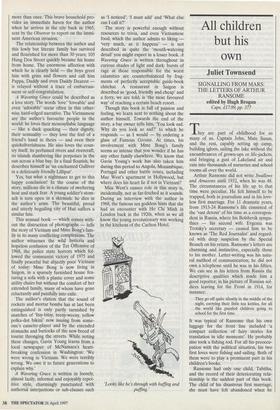Through a nightmare to Lilliput
Andrew Barrow
A WAVERING GRACE: A VIETNAMESE FAMILY IN WAR AND PEACE by Gavin Young Viking, £17.99, pp. 238 The horrors of Vietnam dominated the media during my formative years but I'm afraid I steered clear of it all. News of napalm attacks, massacres, mass graves, street fighting, disembowelments and other horrendous acts of vengeance simply washed over me and far too many of my contemporaries.
This unusual book by a senior war reporter brought home the full atrocity and tragedy of Vietnam to me at last, along with a sense of the beauty of the place and its people, whose 'wavering grace' — the phrase comes from a poem by Herbert Read — has apparently finally won the day.
Gavin Young weaves his narrative around a particular family trapped between the cruel and corrupt forces of communism and the equally corrupt and repressive American war machine. At the head of the family is Madame Bong, a woman with great strength of character, ramrod back and piercing, fearless gaze. Family and friends matter more to her than anything, especially guns. 'Let's get rid of that thing for a start,' she says, seizing a rifle from a hot-headed son and thrusting it into a drawer.
A few months later, this remarkable woman is out on the battlefield picking up dismembered bits of another of her sons, who has been blown apart by a mortar bomb. She carries the pieces home in a plastic bag.
Mme Bong's spotlessly clean shopfront house in the antique city of Hue is at the centre and heart of this book. Here she lives with her extended family and a dog called Mimi, who snatches a chicken off the dining table — the incident is mentioned more than once. This brave household pro- vides an immediate haven for the author when he arrives in the city back in 1965, sent by the Observer to report on the immi- nent American invasion.
The relationship between the author and this lowly but literate family has survived and flourished for more than 30 years; 103 Hung Doa Street quickly became his home from home. The enormous affection with which he is clearly held — the boys greet him with grins and flowers and call him Pappa, Daddy and even Daddy Dearest is relayed without a trace of embarrass- ment or self-congratulation.
A Wavering Grace could be described as a love story. The words love"loveable' and even 'adorable' occur often in this other- wise hard-edged narrative. The Vietnamese are the author's favourite people in the world: he loves their monosyllabic language — like a duck quacking — their dignity, their sensuality — they love the feel of a friend's hand in theirs — and even their quicksilverishness. He also loves the coun- try itself, its perfumed rivers and rivercraft, its islands slumbering like porpoises in the sun across a blue bay. In a final flourish, he describes himself as 'an enchanted Gulliver in a deliriously friendly Lilliput'.
Yes, but what a nightmare to get to this happy conclusion! In the course of the story, millions die in a climate of sweltering heat and stark fear. A young soldier's stom- ach is torn open in a skirmish: he dies in the author's arms. The beautiful, proud and utterly beguiling city of Hue suffers a similar fate.
This sensual book — which comes with- out the distraction of photographs — tells the story of Vietnam and Mme Bong's fam- ily in its many conflicting complexions. The author witnesses the wild hysteria and hopeless confusion of the Tet Offensive of 1968, the police state horrors which fol- lowed the communist victory of 1975 and finally peaceful but abjectly poor Vietnam of today: Mme Bong is now living in Saigon, in a sparsely furnished house fea- turing a sofa with a plastic cover and some utility chairs but without the comfort of her extended family, many of whom have gone reluctantly and painfully into exile.
The author's elation that the sound of rockets and mortar bombs has at last been extinguished is only partly tarnished by snatches of Itsy-bitsy, teeny-weeny, yellow polka-dot bikini' now issuing from some- one's cassette-player and by the extended stomachs and buttocks of the new breed of tourist thronging the streets. While noting these changes, Gavin Young learns from a local newspaper of McNamara's heart- breaking confession in Washington: 'We were wrong in Vietnam. We were terribly wrong. We owe it to future generations to explain why.'
A Wavering Grace is written in loosely, almost lazily, informal and enjoyably repet- itive style, charmingly punctuated with authorial interjections or sub-clauses such as 'I noticed', 'I must add' and 'What else can I call it?'
The story is powerful enough without resources to trivia, and even Vietnamese food, which the author admits to liking 'very much, as it happens' — is not described in quite the 'mouth-watering detail' you might expect in a lesser book. A Wavering Grace is written throughout in curious shades of light and dark: bursts of rage at those responsible for the worst calamities are counterbalanced by frag- ments of perfectly acceptable guide-book chitchat. A restaurant in Saigon is described as 'good, friendly and cheap' and a ferry, we are told, is 'the most favoured way' of reaching a certain beach resort.
Though this book is full of passion and feeling, we learn next to nothing about the author himself. Towards the end of the story, a bar owner tells him, 'You look sad. Why do you look so sad?' to which he responds — as I would — by ordering a glass of Famous Grouse. At times, his involvement with Mme Bong's family seems so intense that you wonder if he has any other family elsewhere. We know that Gavin Young's work has also taken him during this period to Angola, Mozambique, Portugal and other battle zones, including Mae West's apartment in Hollywood, but where does his heart lie if not in Vietnam?
Miss West's cameo role in this story is, incidentally, not as far-fetched as it sounds. During an interview with the author in 1968, the famous sex goddess hints that she had an encounter with Ho Chi Minh in London back in the 1920s, when as we all know the young revolutionary was working in the kitchens of the Carlton Hotel.
`Looks like he's through with huffing and puffing.'



































































 Previous page
Previous page